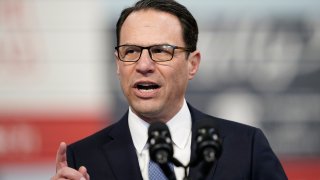
What to Know
- Gov. Josh Shapiro says he'll appeal a court ruling that blocked a state regulation to make Pennsylvania’s power plant owners pay for their planet-warming greenhouse gas emissions.
- Still, the Democrat on Tuesday urged lawmakers to get to work on a better alternative. In a statement, Shapiro didn’t pledge to enforce the regulation, should his administration win the appeal at the state Supreme Court. His administration says his appeal rests on the need to preserve executive authority.
- The court case revolves around the centerpiece of former Gov. Tom Wolf’s plan to fight global warming and make Pennsylvania the first major fossil fuel-producing state to adopt a carbon-pricing program.
Gov. Josh Shapiro's administration said Tuesday that it is appealing a court ruling that blocked a state regulation to make Pennsylvania's power plant owners pay for their planet-warming greenhouse gas emissions, even as the Democrat warned lawmakers to get to work on a better alternative.
In a statement, Shapiro didn't pledge to enforce the regulation, should his administration win the appeal at the Democratic-majority state Supreme Court. His appeal revolves around the need to preserve executive authority, his administration said.
But he also urged lawmakers to come up with an alternative plan.
Get Philly local news, weather forecasts, sports and entertainment stories to your inbox. Sign up for NBC Philadelphia newsletters.
“Now is the time for action,” Shapiro's office said. "Inaction is not an acceptable alternative.”
Action seemed unlikely, however, as Republicans who control the state Senate criticized Shapiro's decision to appeal and said it would hamper any meaningful discussion of energy and environmental policy.
Environmental advocacy groups applauded the appeal.
Local
Breaking news and the stories that matter to your neighborhood.
The case revolves around the centerpiece of former Gov. Tom Wolf’s plan to fight global warming and make Pennsylvania the first major fossil fuel-producing state to adopt a carbon-pricing program.
In a Nov. 1 decision, a 4-1 Commonwealth Court majority agreed with Republican lawmakers and coal-related interests that argued that Wolf's carbon-pricing plan amounted to a tax, and therefore required legislative approval.
Wolf, a Democrat, had sought to get around legislative opposition by unconstitutionally imposing the requirement through a regulation, opponents said.
The regulation had authorized Pennsylvania to join the multistate Regional Greenhouse Gas Initiative, which imposes a price and declining cap on carbon dioxide emissions from power plants.
Shapiro has criticized it, but also has not said definitively whether he would enforce it, should he prevail in court. Shapiro's message to lawmakers Tuesday also did not describe the need to fight climate change.
Rather, he couched the matter in different terms, calling it “commonsense energy policy" and said he would sign another carbon-pricing plan, should it win legislative approval.
“Should legislative leaders choose to engage in constructive dialogue, the governor is confident we can agree on a stronger alternative to RGGI," Shapiro's office said in the statement. “If they take their ball and go home, they will be making a choice not to advance commonsense energy policy that protects jobs, the environment and consumers in Pennsylvania.”
Such a plan continues to have no chance of passing the state Legislature, where the Republican-controlled Senate has been protective of hometown coal and natural gas industries in the nation’s No. 2 gas state.
Republican lawmakers had hailed the court’s decision to block the regulation and had urged Shapiro not to appeal it.
Rather, Republicans have pushed to open greater opportunities for energy production in the state and warned that the regulation will raise electricity bills, hurt in-state energy producers and drive new power generation to other states while doing little to fight climate change.
In a statement, Senate Majority Leader Joe Pittman, a Republican from Indiana County, called the appeal “misguided.”
“Gov. Shapiro’s action further places family sustaining jobs at risk and stymies the ability for any meaningful conversations on energy and environmental policy in the Pennsylvania legislature," Pittman said. “The governor should be standing with working families who are struggling with inflationary costs and pressures from higher electric bills.”
In the House, where Democrats hold a one-seat majority, neither a carbon-pricing plan, nor Shapiro’s most well-defined clean-energy goal — a pledge to ensure that Pennsylvania uses 30% of its electricity from renewable power sources by 2030 — have come up for a vote.
Backers of the regulation included environmental advocates as well as solar, wind and nuclear power producers.
They have called it the biggest step ever taken in Pennsylvania to fight climate change and said it would have generated hundreds of millions of dollars a year to promote climate-friendly energy sources and cut electricity bills through energy conservation programs.
Opponents included natural gas-related interests, industrial and commercial power users and labor unions whose members build and maintain pipelines, power plants and refineries.
___
Follow Marc Levy: http://twitter.com/timelywriter



